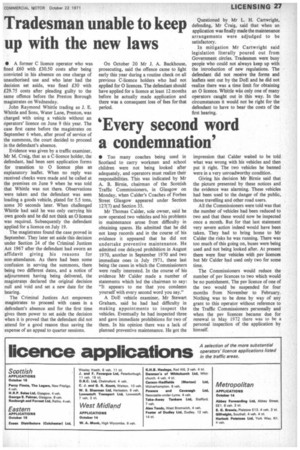Tradesman unable to keep up with the new laws
Page 29

If you've noticed an error in this article please click here to report it so we can fix it.
• A former C licence operator who was fined £60 with £30.50 costs after being convicted in his absence on one charge of unauthorised use and who later had the decision set aside, was fined £30 with £29.75 costs after pleading guilty to the same offence before the Preston Borough magistrates on Wednesday.
John Raymond Whittle trading as J. E.
Whittle and Sons, Water Lane, Preston, was charged with using a vehicle without an operators' licence on June 9 this year. The case first came before the magistrates on September 6 when, after proof of service of the summons, the court decided to proceed in the defendant's absence.
Evidence was given by a traffic examiner, Mr M. Craig. that as a C-licence holder, the defendant, had been sent application forms for transition to 0 licence plus an explanatory leaflet. When no reply was received checks were made and he called at the premises on June 9 when he was told that Whittle was not there. Observations were taken and the defendant was seen loading a goods vehicle, plated for 5.5 tons, some 30 seconds later, When challenged Whittle had said he was only carrying his own goods and he did not think an 0 licence was required. Subsequently the defendant applied for a licence on July 19.
The magistrates found the case proved in September. They later set aside this decision under Section 24 of the Criminal Justices Act 1967 after the defendant had sworn an affidavit giving his reasons for non-attendance. As there had been some confusion in serving the summons, there being two different dates, and a notice of adjournment having being delivered, the magistrates declared the original decision null and void and set a new date for the hearing.
The Criminal Justices Act empowers magistrates to proceed with cases in a defendant's absence and for the first time gives them power to set aside the decision when it is proved that the defendant did not attend for a good reason thus saving the expense of an appeal to quarter sessions. On October 20 Mr J. A. Backhouse, prosecuting, said the offence came to light early this year during a routine check on all previous C-licence holders who had not applied for 0 Licences. The defendant should have applied for a licence at least 12 months before he actually made application and there was a consequent loss of fees for that period. Questioned by Mr L. H. Cartwright, defending. Mr Craig, said that when an application was finally made the maintenance arrangements were adjudged to be satisfactory.
In mitigation Mr Cartwright said legislation literally poured out from Government circles. Tradesmen were busy people who could not always keep up with the introduction of new regulations. The defendant did not receive the forms and leaflets sent out by the DoE and he did not 'realize there was a time limit for obtaining an 0 licence. Whittle was only one of many operators caught out in this way. In the circumstances it would not be right for the defendant to have to bear the costs of the first hearing.








































































































